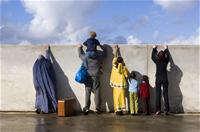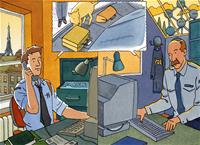A sick is carrying a healthy on his back
Anghel Shoylev Juniour, October 6, 2010
 Many people claim that the differences between the animal and the man are not that big; others say that comparisons are impossible. As usually, the truth is somewhere in between. The man, just like the animal, is looking for the place where he could feel the safest and best - some of us felt such a need, others - did not. This process is called emigration and two leading factors could lead to it - the first is called "pulling" (the strife for better no matter what kind of better), and the second is called "pushing" (the reasons that can force a man leave his homeland).
Many people claim that the differences between the animal and the man are not that big; others say that comparisons are impossible. As usually, the truth is somewhere in between. The man, just like the animal, is looking for the place where he could feel the safest and best - some of us felt such a need, others - did not. This process is called emigration and two leading factors could lead to it - the first is called "pulling" (the strife for better no matter what kind of better), and the second is called "pushing" (the reasons that can force a man leave his homeland).
The main difference between the man and the animal is man's ability (and why not the need) to work. To work in order to eat. Of course, there is a second option which is in the core of the current problem - and that is the part of imigrants whose main aim is to live on the toil of the state, receiving social payments. In the process of human evolution urbanisation and integration bypassed the Third World countries as well as the small neighbourhoods in our own countries, sheltering minorities. This, honestly, sad picture led to the so called "unforeseen circumstances".
The problem, called immigration, internally grew into a conflict in the European Union, capable of losing credibility and integrity in the Union. The Treaties for the establishment of the European Community, developed further into Directive 2004/38/EO of the European Parliament and the Council on April 29, 2004 stipulates that every EU citizen can freely travel within the European Union with a valid identity card or a passport without visa. This was a good news for many of us, but there were factors the forecast of which was impossible at that time.
Who could have guessed that the larger part of the immigrants would be low-qualified and uneducated? The EU is facing a problem, capable of severing even further the economic crisis. And with the time, the problem was slowly growing and a few weeks ago it reached its peak. Many of the Member States have problems with the constantly coming imigrants and the lack of possibilities for housing and jobs.
Yet in 2002 Sweden had to solve a problem with over 800 Bulgarians, 90% of which Roma, who were forced to return to Bulgaria. Recently France undertook same measures in order to tackle the Roma "incursion". Europe turned into a safe heaven for refugees from various crisis spots on the planet, without being well prepared for this. The conflict is easy to comprehend and the participants in it can be divided into two "teams": on the one side of the playground is the European Commission, which is protecting the European legislation and is ready to sanction violations.
On the other side are Member States that have encountered the problems, evoked by the big numbers of immigrants and the trend more and more of them to be low-qualified and even undereducated. A large part of whom - Roma. Only in Bulgaria the number of Roma is over 700 thousand and Bulgaria is not the only or the biggest "source" of Roma in Europe. Besides, the need of integration is not valid for the Roma only but for all the rest that need education, qualification and social realisation.
This would cost dearly to the economy but is of interest of its future and could give back. The current situation is far worse: stimulation of indolence and lack of education within the minorities that rely mainly on social assistance. Their integration is not an easy task; it is a process which has to be directed mainly to the young. Integration is a process for which all Member States have to be prepared.
The core of the problem is neither in the European legislation nor in the countries that are trying to protect their national values, economy and development, chasing away those of the immigrants who are not ready to give back to the state in return for its help. A future of amended legislation, forbidding the free movement of certain people within the EU, could lead to nothing good, on the contrary. This would be a future of conflicts and selfishness.
that are trying to protect their national values, economy and development, chasing away those of the immigrants who are not ready to give back to the state in return for its help. A future of amended legislation, forbidding the free movement of certain people within the EU, could lead to nothing good, on the contrary. This would be a future of conflicts and selfishness.
On the other hand, if Member States continue expelling people of various ethnicities and parts of the world without changes in legislation, the sanctions and the quarrels among EU countries and beyond will go on forever. Thus destroying the history, progress and respect the EU has been building for years, clearing the way for Europe that is torn apart.
Austria and Germany are planning tightening of the rules for foreign workers from eight countries from Eastern and Central Europe. Britain also plans restricting the number of immigrants, accepted annually. On its part, the European Commission is planning to tighten EU rules for refugees and their welfare. Non-integration of candidate EU citizens is not a problem that can be ignored and its solution is not a simple deportation.
According to the current European legislation, no one has the right to stop people - be it Roma or not - to travel freely within the EU. So, the solution is different - the EU should act as a Community and Member States should undertake integration measures together, because otherwise the problem would remain and will continue to grow with striking speed. These people have to find their place in society, no matter where. Slowly they have to be leveled up to the main population in terms of education and qualification. This is the only solution. And lastly - this should not be allowed to turn into a conflict, tearing the EU apart. This should be perceived as a problem which requires adequate solution and a lot of joint work.